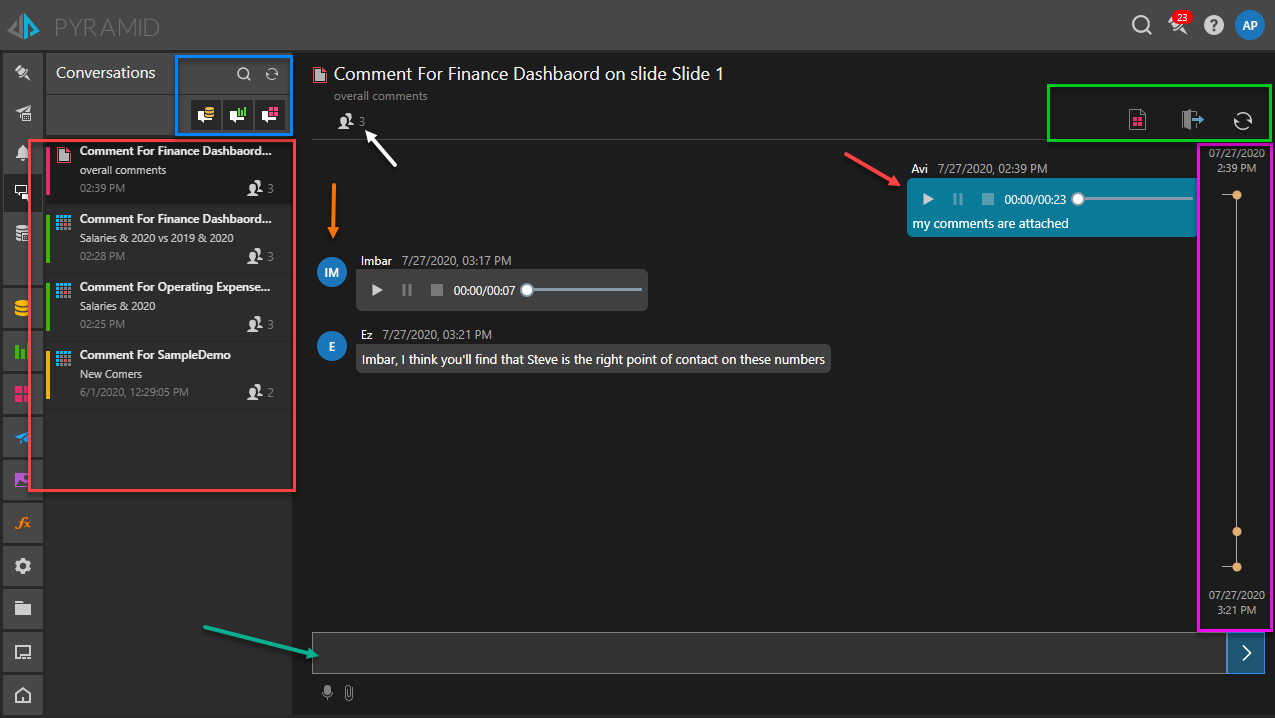The Conversations board displays any conversation threads in which the user is a participant. Users can create new conversation threads from Discover reports or Present dashboards and include other users in those threads. When a user opens the relevant content item, those conversations are available to the user. However, it requires the user to KNOW which content items (or data models) to open.
The Conversations Board, provides an alternative entry point, by pooling all relevant conversations into a single interface - and then allowing the user to converse directly or allowing the user to jump to the relevant content items for both context and the ability to continue the thread and discussion.
The Conversations feature must first be enabled from the Admin console.
This feature is available with Enterprise licensing only.
Conversations List
A notification is be displayed for a user when they have any new unread messages on any of their conversation threads. If messaging is enabled, they may also get an email telling them to join a conversation.
Going into the Bulletin board, and then to the Conversation Board, users will see a list of current conversations on the left (red box below).

From the panel users can (blue box above):
- Search by conversation title or description. Search will also automatically find all relevant names and descriptions of related content in the search mechanism as well.
- Refresh the list of conversations
- Filter the conversation threads by:
- Global Conversations - which means any threads that are related to a data model, and NOT to a specific report or dashboard.
- Discover Conversations - which means any threads that are related to a specific Discover report, and NOT to a specific dashboard or to a general data model.
- Present Conversations - which means any threads that are related to a specific Present dashboard, and NOT to a specific report or to a general data model.
Click on a conversation item in the left hand panel to open it and see the discussion thread on the right.
Thread Chat Panel
The thread chat panel on the right shows a classic chat format of comments written by each participant in the conversation. If the comments include audio or file attachments they will be visible for each message on the screen (red arrow).
Write Comments
Users can elect to write comments immediately into this panel, or choose to open up the underlying reporting content and comment from there (teal arrow). When writing new comments, they can include text, recorded audio (from inside the browser itself) or file attachments.
To add the comment, click the arrow on the far right.
Browser based audio recording requires the site to be running in secured mode (HTTPS) and an operational microphone.
Comment Rating
In comment ratings are enabled, each comment in a thread can be given a rating by each participant (thumbs up or down). This can be useful to gauge who in the chat agrees or disagrees with ideas and suggestions.
Conversation Timeline
The conversation timeline (purple box above) shows comments in the thread over time. The position and size of the circles on the timeline indicates periods with more activity. Comments are grouped depending on the duration of the conversation. For example, an older conversation may be grouped by days or weeks.
Timeline Interactions
Hover over a circle to see the date of the first comment made in that cluster of comments. Clicking on the circle will jump you to the first item in the conversation listing.
Thread Actions
For any loaded thread, the user can perform different actions, beyond writing comments (green box above and yellow box below):
- Load current Discover Report or Present Dashboard: opens the current data discovery or presentation dashboard to which the comments are attached. If the conversation is global, this option is not available.
- Load Data Snapshot: open the original query results stored at the time the snapshot was taken.
- Load Discover Report Snapshot: open the original report design, with updated data.
- Leave Conversation: this option allows users to remove themselves from the thread, but it is not available for users added by role to a conversation.
- Click on the user icon (white arrows) to view conversation participants.
